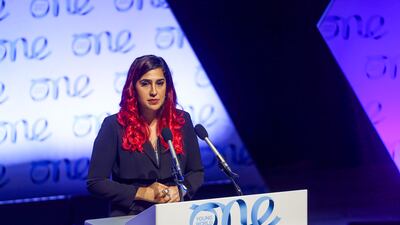Entrepreneur Rana Hajirasouli hopes to convince businesses to treasure the things that they do not use.
“There’s no such thing as too low value in waste,” she told The National.
In 2021, Ms Hajirasouli, who lives in Dubai, launched The Surpluss, a UAE-based platform for companies to share unused resources such as excess products that would normally go to landfills as well as resources and technologies tucked away in storage waiting to be used.
“It’s not just stuff that companies produce, but extra warehouse space, surplus stock and extra knowledge,” she explained.
In one year, the company has diverted more than 1 million kilograms of waste product from landfills. A newly signed contract will see The Surpluss take on an additional 20,000 UAE-based companies this year.
And now, Ms Hajirasouli has her eyes set on the UK, where she hopes to expand her company while completing a doctorate in industrial sustainability and resilience at the University of Cambridge.
“We’re really hoping to get to our mark of a million SMEs by the end of next year,” she said.
Ms Hajirasouli, 29, has always been passionate about the environment. When she was six years old, she organised her school’s first beach clean along the coast of Sharjah, where she grew up. But for years, she did not feel confident enough to launch a business dedicated to sustainability.
“I just never had the courage to really go for it, because I didn’t understand the problem deeply enough, I didn’t know the angle,” she said.
Launching the company in the UAE has been an opportunity to “give back” to the “community” which she calls home.
In the UAE, textile businesses have been The Surpluss’s biggest clients so far, followed by supermarkets looking to sell their extra stock.
“They were the low-hanging fruit,” she explained. Small grocers in the UAE have been able to sell unsold produce that sits within a 14-day expiration date to social enterprises and food banks.

Construction companies and those handling chemicals have also taken up the service – but not without hesitation.
“We had a challenge at the beginning teaching them the benefits of the platform and what they’re going to get out of it. Then they get a bit comfortable and they start using it,” she said.
The main challenge is convincing new customers to sign up in the first place.
Companies often find it cheaper and easier to dispose of their excess products than to try to store or sell it elsewhere.
But she believes that companies will start making a profit on their waste within two and a half months of using the platform, and that doing so will take only 3 to 4 minutes of their time every day.
Ms Hajirasouli spoke to The National from the One Young World Summit in Belfast, an annual event that brings together young leaders and innovators from around the world.
She attended the event as a BP Net Zero scholar and was invited to speak about tech solutions to the food crisis. She will also receive mentoring from the former president of Columbia, Juan Manuel Santos.
“When do you get these opportunities, it’s just so rare,” she said.
One area she believes needs urgent addressing is pharmaceuticals and health care, where waste products cannot be so freely exchanged.
“Something that keeps coming up in the healthcare sector is how much waste is actually produced,” Ms Hajirasouli said.
“But because of policy and regulation and the really limited way that they can work with certain types of medicines, they’re not allowed to reallocate that.”
However Ms Hajirasouli was hopeful that solutions will be found soon, based on conversations she has had with experts from the industry at the event.
“If there's people within those verticals that are already addressing the problem, they know that it exists, they're passionate about it, that's 50 per cent of the heavy lifting,” she said.
The Surpluss provides a “bridge” for small to medium sized businesses that would not necessarily have the budget to appoint an in-house sustainability team.
“SMEs don’t have the same access to resources or the financial budgets that large companies do for sustainability resources and getting them climate smart,” said Ms Hajirasouli.
“We provide a digital platform for them to bridge that gap, exchange those extra resources for profit and reduce their greenhouse gas emissions while they’re doing so.”
Sustainability goals may be widely touted, she explained, but developing the expertise to achieve these is costly.
“We’ve got all these very fancy words like net zero and carbon offsetting, but its doesn’t actually mean anything for SMEs,” Ms Hajirasouli said.
“Internal expertise within an organisation is generally hard to tap into within the market, or you’d have to hire in extra consultants for that.”
Ms Hajirasouli hopes to expand the company in the UK by working with local councils.
“We’re going to government and working with various city councils there. We’re doing a 50-50 profit share,” she explained.
“That gives them an incentive to make a small profit for themselves, be able to fund sustainability projects and show the community that they care.”
She expects the uptake in the UK to be slower and more “conservative” than in the UAE.
“Adoption levels are much faster in the UAE. [In the UK] it’s more administrative and logistical concerns but the appetite is generally there,” she said.


